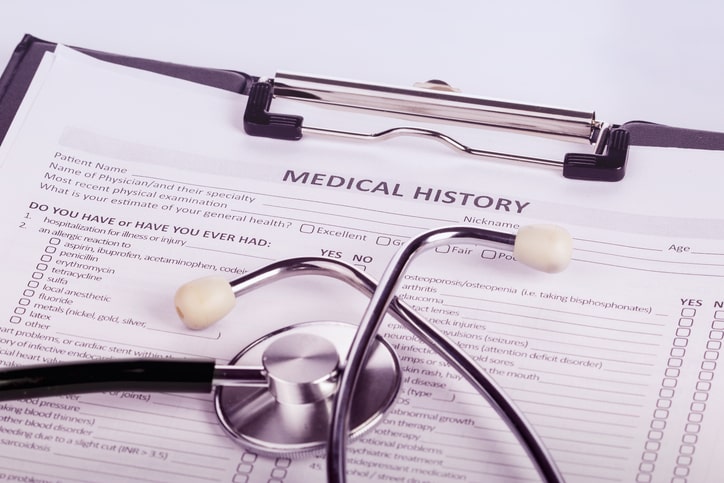Get Our Insider to Property Damage Brochure

How Medical Records Impact Personal Injury Claims in North Carolina
October 21, 2024At Dewey, Ramsay & Hunt, P.A., our personal injury lawyers in Charlotte know that medical records are objective evidence that provides documentation that links your injury to the accident, proves your injuries’ severity and nature, and supports your North Carolina personal injury claim.
Here, we discuss why they matter so much.
The Critical Role of Medical Records in North Carolina Personal Injury Claims
If you’ve been injured in an accident, you must seek medical care immediately, follow through on all recommended treatments, and ensure your condition is accurately documented.
Your medical records will be a crucial part of your North Carolina personal injury claim because they provide:
- Proof of Injury: Medical records document your injuries in detail, offering solid proof that you were harmed in the accident. These records include doctor’s notes, diagnostic tests, imaging results, and hospital visits, which provide the necessary information to show the extent of your injuries.
- Causation: One of the critical factors in any personal injury claim is proving that your injury was directly caused by the accident in question. Medical records help establish this link. They demonstrate that you sought medical attention soon after the accident and that the injuries were consistent with the type of accident you were involved in.
- Severity of Injuries: The amount of compensation you can recover often depends on the severity of your injuries. Medical records detail your physical condition, the treatments you’ve undergone, and any potential long-term or permanent damage. This documentation helps your attorney argue for adequate compensation for medical expenses, lost wages, and pain and suffering.
- Treatment History: Consistency in medical treatment is essential in a personal injury claim. The defense may use gaps in treatment or failure to follow through with doctor’s recommendations to argue that your injuries are not as severe as claimed or that you are not taking them seriously. Detailed medical records show that you have followed all medical advice, reinforcing the seriousness of your condition.
- Clarity on Pre-existing Conditions: If you have any pre-existing medical conditions, the defense may try to argue that your injuries were not caused by the accident but were pre-existing. Medical records can clarify the difference between your condition before and after the accident. By showing that your injuries were either new or aggravated by the incident, your records can counter any attempts to undermine your claim.
How Medical Records Can Support Your Personal Injury Claim
To ensure that your medical records effectively support your personal injury claim, you should take a few essential steps.
They include:
- Seek Medical Attention Immediately: After an accident, seeking medical care right away is crucial, even if your injuries are minor. Some injuries, like concussions or internal injuries, may not be immediately apparent but can become severe over time. Prompt medical attention ensures your health and well-being and creates a timely record linking your injury to the accident.
- Follow All Treatment Recommendations: Consistently following your doctor’s advice shows you are taking your recovery seriously. This may include attending follow-up appointments, undergoing physical therapy, and taking prescribed medications. Your medical records will reflect this, reinforcing the legitimacy of your claim.
- Be Honest About Your Symptoms: Always be transparent about your symptoms when speaking to your doctor. Downplaying your symptoms can result in incomplete medical records, which could harm your claim. On the other hand, exaggerating or lying about your condition can lead to credibility issues if your medical records don’t support your statements.
- Document Any Changes in Your Condition: If your injuries worsen or new symptoms arise after the initial medical evaluation, return to your doctor and have the changes documented. These additional records will show the progression of your condition, which may affect the compensation you can seek for future medical expenses and pain and suffering.
Common Types of Medical Records in Personal Injury Cases
In personal injury cases, some of the most important medical records include:
- Doctor’s notes: These include the physician’s observations, diagnosis, and any prescribed treatments or restrictions.
- Imaging and diagnostic tests: X-rays, MRIs, CT scans, and other diagnostic tests provide tangible evidence of your injuries.
- Medical bills and receipts: Documentation of all medical expenses is critical for calculating the financial losses associated with your injury.
- Discharge summaries: These provide an overview of your treatment, follow-up care instructions, and any medical restrictions.
- Physical therapy notes: If you’ve undergone physical therapy, these notes show your progress and the ongoing impact of the injury.
Contact Our North Carolina Personal Injury Attorney Today
Working with our experienced North Carolina personal injury attorneys can help you obtain, organize, and present your medical records effectively to maximize your chances of receiving fair compensation. Contact our personal injury attorneys in Charlotte at Dewey, Ramsay & Hunt, P.A., to ensure your story is heard during a free consultation by calling 704-377-3737 or contacting us online.
We provide unique legal services tailored to each client’s needs and do not get paid unless you do.
Your Injury, Our Fight. How can we help you take a stand?
Because every case is different, the description of awards and issues previously managed by our law firm does not guarantee a similar outcome in current or future cases.
Related Links
- Why the Timing of a North Carolina Personal Injury Claim Matters
- What is My North Carolina Personal Injury Claim Worth?
- Can I File a Personal Injury Claim on Behalf of a Loved One Who is Catastrophically Injured?

